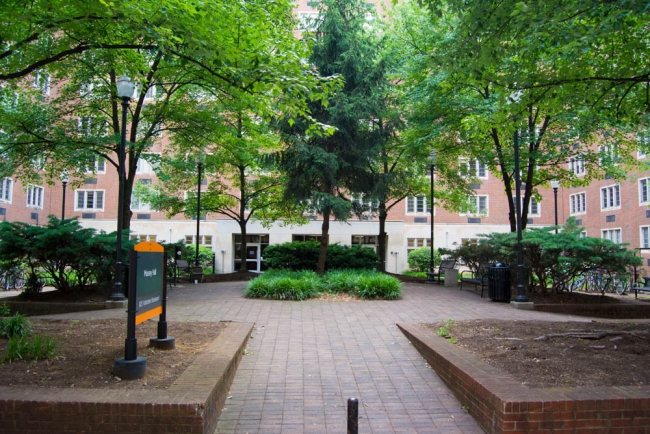You have /5 articles left.
Sign up for a free account or log in.

Massey Hall
University of Tennessee at Knoxville
The University of Tennessee at Knoxville, where the number of students with COVID-19 has almost tripled this month, to 612, told students in one of its residence halls Wednesday that they would have to move out to make room for self-isolating peers.
"I recognize that this is unexpected news and that shifting residence halls will disrupt your semester. I am sorry for the disruption, and we are here to support you academically, socially, mentally, and financially," Frank Cuevas, vice chancellor for student life, said in an email to residents of Massey Hall Wednesday. "I know this is not how you envisioned your semester, and we will work to support you through this. As circumstances evolve on campus we are adjusting our operational plans to help manage through this pandemic, with our top priority being the health and well-being of our campus community."
Like many major public universities, Tennessee is seeing large numbers of students test positive for COVID-19 and much larger numbers in isolation or quarantine. The University of Tennessee system coronavirus dashboard shows a doubling of the number of students in either isolation or quarantine at the Knoxville campus between Aug. 31 and Sept. 8, to 2,025 from 990.
Tennessee officials said the hotel they had secured was inadequate to house all the isolating students. They chose Massey for the overflow, they said, because of its size and the fact that it has proportionally few students living there now.
The students who live there can choose between either moving to another residence hall on the campus or canceling their housing contract and moving back home. The university said it would provide "supplies and staff" to help students move to another room on the campus and would "make every effort" to keep roommates together. Students from Massey will be tested before they move, to avoid potentially spreading the virus in that fashion.
Miami University said in late July that despite its original plan to bring most students back to its Ohio campus in mid-August for a fall semester of in-person and hybrid learning, it would delay in-person classes and student move-in until mid-September "to review lessons learned at each interval and adapt accordingly,” President Greg Crawford said at the time.
Late Tuesday, Miami announced that it would begin to bring students back to campus next week and start in-person and blended instruction -- even though the university has reported more than 1,000 student cases in the last two weeks, according to its COVID-19 dashboard.
[block:block=156]
The university said it would be requiring students to be tested upon arrival, and that density in the residence halls would be at about 60 percent of normal capacity. "Overall campus density will be significantly less than normal with nearly half of classes continuing to be delivered online/remotely and many employees continuing to work from home," its statement said.
“This decision was made after many lengthy discussions and consultation with public health experts,” said Crawford. “The health and safety of our students, faculty, and staff, as well as the Oxford community, is our top priority. This decision is an expression of faith and confidence in our students and is grounded in our belief that we can successfully weather this pandemic together.”
Another institution in the state, Ohio University, announced this week that rather than bring most students back to the Athens, Ohio, campus on Sept. 28, as planned, it would limit the number of students to about 7,200, or slightly less than a third of its total population of undergraduate and graduate students. Most courses will be online, even for those students who come to the physical campus.
Most colleges are just feeling their way through the start of the fall term -- but some of them are already starting to share their plans for the spring, in hopes of giving students and families as much advance warning as possible.
On Wednesday, Harrisburg Area Community College became among the first institutions to say that it would conduct almost all instruction online throughout the spring 2021 term. The community college in Pennsylvania said that based on federal and state guidelines and feedback from employees and campus health experts, academic programs that do not involve hands-on or experiential components will be delivered online, along with student services.
“The safety and well-being of our students and employees continues to be our top priority,” said John J. Sygielski, the college's president and CEO. “I know it has not been easy for our students and employees to juggle family, school and work responsibilities while maintaining their and their family’s well-being. However, I continue to be impressed and inspired by our students and employees who have worked so hard to make the successful transition of HACC’s instruction and services to online.”
In the last several days, institutions such as Pennsylvania State and Purdue Universities and the Universities of Connecticut and Texas at San Antonio have announced tentative plans for how they will deliver instruction in spring 2021.
To varying degrees, all of the institutions said they would continue to teach at least some of their courses virtually and have fully online options available to students.
"At this point we expect that modalities for our spring courses and campus operations will look very similar to this fall -- mostly online," Taylor Eighmy, president of UT San Antonio, said in an update to students and employees this week.
Purdue, whose president, Mitch Daniels, has aggressively advocated the university's decision to largely reopen its campus this fall, said in its message that "the spring semester is planned as a residential semester similar to the current fall semester, with a focus on campus de-densification and offering hybrid/HyFlex courses. However, to accommodate any student who cannot come to campus because of travel restrictions or who chooses not to out of personal health and safety concerns, a fully online option will again be offered."
Penn State said it was planning for "flexible instructional modes" come spring, too.









